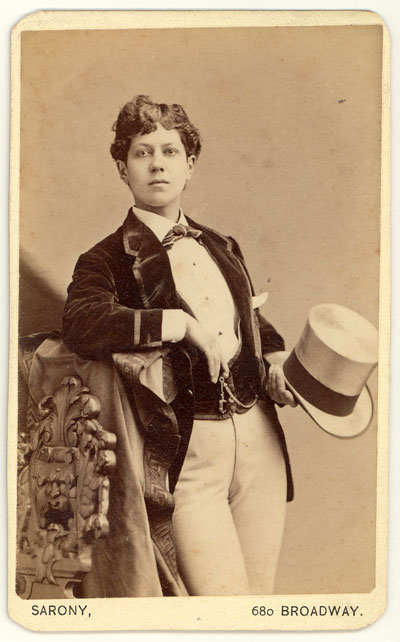Difference between revisions of "Wilson Collection: Annie Hindle and Ella Wesner"
(Annie Hindle and Ella Wesner) |
(Annie Hindle and Ella Wesner) |
||
| Line 1: | Line 1: | ||
[[File:Wesner.jpg]] | [[File:Wesner.jpg]] | ||
| − | (Carte de visite photograph of Ella Wesner, circa 1872) | + | ''(Carte de visite photograph of Ella Wesner, circa 1872)'' |
Under construction. | Under construction. | ||
| − | Annie Hindle and Ella Wesner | + | '''Annie Hindle and Ella Wesner''' |
The newspaper report stated: One June night in 1886 a Grand Rapids “minister of the Gospel” pronounced “Annie Hindle the husband of Annie Ryan.”[1] The “jolly Gilbert Saroney, who, oddly enough, was a female impersonator,” was best man.[2] | The newspaper report stated: One June night in 1886 a Grand Rapids “minister of the Gospel” pronounced “Annie Hindle the husband of Annie Ryan.”[1] The “jolly Gilbert Saroney, who, oddly enough, was a female impersonator,” was best man.[2] | ||
| Line 11: | Line 11: | ||
According to that New York Sun 1891 article, Hindle was the “first out and out ‘male impersonator’ New York’s stage had ever seen.”[3] The first to imitate Hindle was Ella Wesner beginning in 1870. Both performers were popular and well paid. Wesner, like Hindle, grabbed media-attention--in 1872 with her same-sex “elopement…to Europe with Miss Josephine Mansfield.”[4] | According to that New York Sun 1891 article, Hindle was the “first out and out ‘male impersonator’ New York’s stage had ever seen.”[3] The first to imitate Hindle was Ella Wesner beginning in 1870. Both performers were popular and well paid. Wesner, like Hindle, grabbed media-attention--in 1872 with her same-sex “elopement…to Europe with Miss Josephine Mansfield.”[4] | ||
| − | References | + | ''References'' |
| + | |||
1. Lisa Duggan, Sapphic Slashers: Sex, Violence, and American Modernity ([Durham]: Duke University Press, 2000), 147, accessed October 19, 2012, http://books.google.com/books?id=ino_gj6djj8C&pg=PA147&lpg=PA147&dq=annie+hindle&source=bl&ots=twtRcfT8MR&sig=Nz3JOiqrzzAMEpP5ut7hyatXNfw&hl=en&ei=FUS5ToKDBqjW2AWArMW1Bw&sa=X&oi=book_result&ct=result&resnum=13&ved=0CGMQ6AEwDA#v=onepage&q=annie%20hindle&f=false. | 1. Lisa Duggan, Sapphic Slashers: Sex, Violence, and American Modernity ([Durham]: Duke University Press, 2000), 147, accessed October 19, 2012, http://books.google.com/books?id=ino_gj6djj8C&pg=PA147&lpg=PA147&dq=annie+hindle&source=bl&ots=twtRcfT8MR&sig=Nz3JOiqrzzAMEpP5ut7hyatXNfw&hl=en&ei=FUS5ToKDBqjW2AWArMW1Bw&sa=X&oi=book_result&ct=result&resnum=13&ved=0CGMQ6AEwDA#v=onepage&q=annie%20hindle&f=false. | ||
2. Ibid., 147. | 2. Ibid., 147. | ||
3. Ibid., 146. | 3. Ibid., 146. | ||
4. Gillian M. Rodger, Champagne Charlie and Pretty Jemima: Variety Theater in the Nineteenth Century ([Urbana: University of Illinois Press], 2010), 145, accessed October 19, 2012, http://books.google.com/books?id=Cr7NIXKo6- sC&pg=PT147&lpg=PT147&dq=annie+hindle+champagne+charlie+and+pretty+jemima&source=bl&ots=fVd7aLoIzp&sig=gBnC_ch95j_RXxY-hoIoMFQJ3p4&hl=en&ei=dyi5TpK4CMbs2gWe5YGxBw&sa=X&oi=book_result&ct=result&resnum=4&ved=0CDcQ6AEwAw#v=onepage&q=wesner&f=false. | 4. Gillian M. Rodger, Champagne Charlie and Pretty Jemima: Variety Theater in the Nineteenth Century ([Urbana: University of Illinois Press], 2010), 145, accessed October 19, 2012, http://books.google.com/books?id=Cr7NIXKo6- sC&pg=PT147&lpg=PT147&dq=annie+hindle+champagne+charlie+and+pretty+jemima&source=bl&ots=fVd7aLoIzp&sig=gBnC_ch95j_RXxY-hoIoMFQJ3p4&hl=en&ei=dyi5TpK4CMbs2gWe5YGxBw&sa=X&oi=book_result&ct=result&resnum=4&ved=0CDcQ6AEwAw#v=onepage&q=wesner&f=false. | ||
Revision as of 17:40, 2 November 2012
(Carte de visite photograph of Ella Wesner, circa 1872)
Under construction.
Annie Hindle and Ella Wesner
The newspaper report stated: One June night in 1886 a Grand Rapids “minister of the Gospel” pronounced “Annie Hindle the husband of Annie Ryan.”[1] The “jolly Gilbert Saroney, who, oddly enough, was a female impersonator,” was best man.[2]
According to that New York Sun 1891 article, Hindle was the “first out and out ‘male impersonator’ New York’s stage had ever seen.”[3] The first to imitate Hindle was Ella Wesner beginning in 1870. Both performers were popular and well paid. Wesner, like Hindle, grabbed media-attention--in 1872 with her same-sex “elopement…to Europe with Miss Josephine Mansfield.”[4]
References
1. Lisa Duggan, Sapphic Slashers: Sex, Violence, and American Modernity ([Durham]: Duke University Press, 2000), 147, accessed October 19, 2012, http://books.google.com/books?id=ino_gj6djj8C&pg=PA147&lpg=PA147&dq=annie+hindle&source=bl&ots=twtRcfT8MR&sig=Nz3JOiqrzzAMEpP5ut7hyatXNfw&hl=en&ei=FUS5ToKDBqjW2AWArMW1Bw&sa=X&oi=book_result&ct=result&resnum=13&ved=0CGMQ6AEwDA#v=onepage&q=annie%20hindle&f=false. 2. Ibid., 147. 3. Ibid., 146. 4. Gillian M. Rodger, Champagne Charlie and Pretty Jemima: Variety Theater in the Nineteenth Century ([Urbana: University of Illinois Press], 2010), 145, accessed October 19, 2012, http://books.google.com/books?id=Cr7NIXKo6- sC&pg=PT147&lpg=PT147&dq=annie+hindle+champagne+charlie+and+pretty+jemima&source=bl&ots=fVd7aLoIzp&sig=gBnC_ch95j_RXxY-hoIoMFQJ3p4&hl=en&ei=dyi5TpK4CMbs2gWe5YGxBw&sa=X&oi=book_result&ct=result&resnum=4&ved=0CDcQ6AEwAw#v=onepage&q=wesner&f=false.
